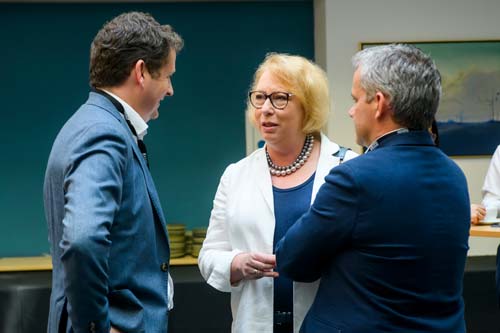The Professions’ Summit - Leading through uncertainty to clarity
One hundred leaders of professional organisations and the academics who study them came to Bayes Business School to discuss the complex interplay of issues currently facing the professions
Following the seismic changes to the world of work over the past five years, 100 senior leaders of professional organisations and the academics who study them came together for The Professions’ Summit at Bayes Business School (formerly Cass) in late June to discuss some of the most pressing issues affecting professionals and their organisations.
Sponsored by Thomson Reuters and organised by Professor Laura Empson, Conference Chair and Director of the Centre for Professional Service Firms at Bayes, the overarching focus of the one-day symposium was “Leading through uncertainty to clarity”, with specific sessions exploring Technology and professional work; Leadership and professional people; Leadership and professional organisations; and Ethics and professional culture.
Alongside presentations from a remarkable line-up of distinguished professionals and academics, the panel discussions provided gave rise to some intense and sometimes heated debate.
Watch a brief video about the Summit:
The highlights of the Summit have been published in a new "Summit Summary Report", and some of the key takeaways from each session are as follows:
Technology and professional work
Featuring presentations from:
- Andy Baldwin, Global Managing Partner – Client Service, EY
- Michael Barrett, Professor of Information Systems and Innovation Studies, Cambridge Judge Business School
- Mark Enzer, Strategic Advisor, Mott MacDonald and Visiting Professor in the Digitalisation of the Built Environment, University of Cambridge
- Crawford Spence, Professor of Accounting, King’s College Business School
The panel continued the debate that begun in the presentations about the fantasies, hopes, and anxieties triggered by current developments in AI within professional organisations. The discussion touched on the difficulties around the language of technology and the extent to which our own limitations are a constraint on the opportunities for technology-based improvements. It was observed that AI will likely result in a reduction in levels of hiring in professional service firms, producing a leaner workforce where technology plays a greater role in handling routine or repetitive work.
Leadership and professional people
Featuring presentations from:
- Kirsten Edwards-Warren, Executive Vice President, Compass Lexecon
- Herminia Ibarra, Charles Handy Chair in Organisational Behaviour, London Business School
- Paul Lewis, Firmwide Managing Partner, Linklaters
- Michelle Rogan, Associate Professor of Strategy and Entrepreneurship, Imperial College Business School
The panel stressed the importance of genuine consultation and listening in leadership, arguing that it can be misused in management contexts as a gloss over already-decided actions. Leaders need to show they are willing to change course based on the input they receive. They must create an environment where disagreements are allowed, and in which listening really happens. Leaders that listen more and ask, “What else?” get closer to the truth of what is happening in their organisations and avoid being misled into solving the wrong problem.
 Caption: Professor Laura Empson talks with attendees at the Summit
Caption: Professor Laura Empson talks with attendees at the Summit
Leadership and professional organisations
Featuring presentations from:
- Paul Adler, Professor of Management and Organisation, Marshall School of Business, University of Southern California
- Laura Empson, Professor in the Management of Professional Service Firms, Bayes Business School
- Tony Hall, Lord Hall of Birkenhead and Former Director General, BBC
- Emily Lawson DBE, Head of the Delivery Unit, 10 Downing Street
The panel looked at the tricky interplay between professional values and commercial pressures, and the implications for organisational structures and cultures. Superficial collegiality can lead to a culture of positive affirmation, leaving the more complex underlying realities unexamined. Getting closer to the truth can involve uncomfortable conversations and may result in unhappy clients. It was agreed that politeness can sometimes conceal or hinder the open expression of dissenting views. Leaders should, therefore, surround themselves with people who are willing to challenge them.
Ethics and professional culture
Featuring presentations from:
- Daniel Beunza, Professor of Social Studies of Finance, Bayes Business School
- Aharon Cohen Mohliver, Assistant Professor of Strategy and Entrepreneurship, London Business School
- Lord David Gold, former Global Senior Partner, Herbert Smith
- Sarah Rapson, Deputy Chief Executive & Executive Director of Supervision, Financial Reporting Council
With the increasing commoditisation and modularisation of professional training systems, it was agreed there is a danger of turning ethics into mere “tick box” tasks, potentially compromising the ethics of professionalism. The broader ethical challenges extend far beyond individual bad apples, bad leaders, or bad organisations. The frequency of ethical scandals raises regulatory concerns about how to punish effectively large-scale unethical behaviour, when borderline unethical practices become normalised across a profession. As commercial values supplant ethical values, these challenges will likely intensify.
Introducing the report about the event, Professor Empson said:
“In the face of significant challenges over the past five years—a global health crisis, political turmoil, and economic disruption—professionals have had to adapt to a landscape of extreme unpredictability. Stress levels are still as high now as they were at the peak of the pandemic, while engagement with work has declined.
“These developments are prompting professionals to reassess, not only their individual roles, but also the wider dynamics at play in their organisations. Much that was previously unimaginable is now an everyday fact of life.
“My vision for this event emerged from the need to bring clarity to the complex interplay of issues currently facing professional service firms and their leaders, by bringing together renowned professionals and the academics who study their organisations. These two groups normally operate in separate spheres. Bringing them together for a day promised new perspectives on the challenges and opportunities ahead.
“This report offers a summary of the highlights of the dynamic and productive conversations we had throughout the day. As we move through the next phase together, I hope this proves to be an enlightening resource and a catalyst for meaningful conversations that help shape the future of our professions.”
